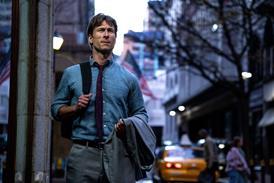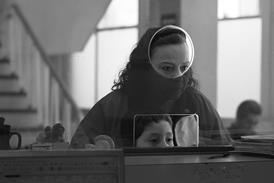Dir: Martin Scorsese. US.2004. 169 mins.
He's perhaps best knownas a nutty old recluse, but it's the younger Howard Hughes, the ambitious movieproducer, industrialist and aviation pioneer, that interests Martin Scorseseand Leonardo DiCaprio in The Aviator, their epic period biopic forMiramax, Warner and Initial Entertainment Group. Director and star paint alively, beautifully crafted and richly detailed portrait of Hughes that isabsorbing enough to justify the film's almost three-hour running time andshould lead to wide awards season recognition. What stops the film from beingwholly satisfying - and may limit its box office performance - is the fact thatthe character on screen remains as emotionally distant from the audience as thereal Hughes seems to have been from those around him.
The combination of Scorsese,DiCaprio and Hughes will exert a powerful pull on mature moviegoers whenMiramax opens The Aviator in the US on December 17, though the film willface plenty of classy competition and may be commercially handicapped by itslength. The eventual size of the domestic take will depend largely on theextent to which DiCaprio - helped by cameos from the likes of No Doubt singerGwen Stefani - can still a youthful crowd as well.
The subject matter won'tcount for as much in the international market, where Miramax and Warner aredistributing in some territories and independents in others, with the rolloutstarting in the UK the day after Christmas and continuing through January andFebruary. But Scorsese's and DiCaprio's recent films -- including their lastteaming, Gangs Of New York -- have often done better overseas thandomestically and the pattern looks likely to repeat in this case.
International and domesticbox office would be substantially boosted, of course, by awards recognition.Already picked as the year's second best film by the National Board of Review, TheAviator looks like a good prospect for a Best Picture Oscar nomination andit could give Scorsese yet another chance to finally take home the Academy'sBest Director statuette.
Scorsese (who took on theproject after Michael Mann dropped out) stamps the film with his customaryvisual panache, using a gradually shifting colour palette that's meant toresemble the early Technicolor systems used in Hughes' day.
Credit for much of thestory's dramatic momentum, though, goes to John Logan (Gladiator, The LastSamurai), whose script charts a careful course through Hughes' eventfulearly adult life.
After a brief butsignificant childhood scene, the story jumps to Hollywood in the mid-1920s,with the young Texan millionaire using his newly inherited fortune to makeWorld War I air action movie Hell's Angels. Moving at a pace that reflects itssubject's impatient ambition, the film follows Hughes for two decades, throughhis career as a maverick producer, his Hollywood love affairs, his growingpassion for flying and his grand schemes to revolutionise air travel. It alsoobserves the gradual escalation of Hughes' obsession, paranoia and germ phobia.
The first hour takes itstone from Hughes' youthful enthusiasm and includes some thrilling aerial actionsequences. Mixing retro effects produced with models and miniatures withdigital technology, Scorsese gives the airborne scenes a heightened reality andpulls off shots that wouldn't have been possible using only real planes.
The film's main love storyhas the increasingly renowned Hughes falling for Katharine Hepburn (Blanchett)just as Hepburn is becoming disillusioned with fame and Hollywood. Hepburnoffers Hughes a chance to open up and escape from his own dark side, but Hughescan't take the leap and the affair ends prematurely (for the couple and,arguably, for the film).
The story then turns itsfocus to Hughes' mental slide, as the energetic young man starts to turn into atwitchy obsessive who only relaxes when he is talking about or flying planes.There's occasional comic relief - notably from a scene that has Hughes arguingwith Hollywood censors about the prominence of Jane Russell's breasts innotorious western The Outlaw - but the descent into paranoia makes foruncomfortable and not particularly enlightening viewing.
After nearly losing his lifein the crash of a prototype spy plane, Hughes has a full-scale breakdown thatforeshadows his secluded old age in Las Vegas. He rallies, however, when acrooked politician (Alda) tries to destroy his airline business. The recoveryproduces a final act that is more conventionally engaging than the rest of thefilm, with Hughes now becoming a more sympathetic figure, a dreamer fightingback against big business and petty corruption.
The bitter sweet climaxcomes with the first and only flight of the 'Spruce Goose,' the massive cargoplane that Hughes spent years designing and building.
If The Aviator doesemerge as an awards frontrunner, the film's central performance could beanother recognized element. Though he sometimes looks young for the part,DiCaprio shows hugely impressive stamina and focus, making both Hughes' driveand his frailty completely believable.
The film doesn't give otherperformers much room to shine, but Blanchett is convincing and fascinating asHepburn and Beckinsale is appealing as Hughes' other close girlfriend, theearthy but affectionate Ava Gardner. Baldwin (as the head of a rival airline),Reilly (as Hughes' financial wizard) and Alda do strong work in theirsupporting roles and Stefani (as Jean Harlow) and Law (as Errol Flynn) doenjoyable cameos.
Among the top notch behindthe scenes contributors are director of photography Robert Richardson,production designer Dante Ferretti (a Scorsese regular), costume designer SandyPowell and composer Howard Shore.
Prod cos: Forward Pass Inc, Initial Entertainment Group.
Dists: Miramax (US, France, Germany, Italy, UK), Warner Bros (LatinAmerica, Australia).
Intl sales: Initial.
Prods: Michael Mann, Sandy Climan, Graham King, Charles Evans Jr.
Exec prod: Chris Brigham.
Scr: John Logan.
Director of Photography: Robert Richardson.
Prod des: Dante Ferretti.
Costume des: Sandy Powell.
Ed: Thelma Schoonmaker.
Music: Howard Shore.
Main cast: Leonardo DiCaprio, Cate Blanchett, Kate Beckinsale, John CReilly, Alec Baldwin, Alan Alda, Jude Law.


















No comments yet